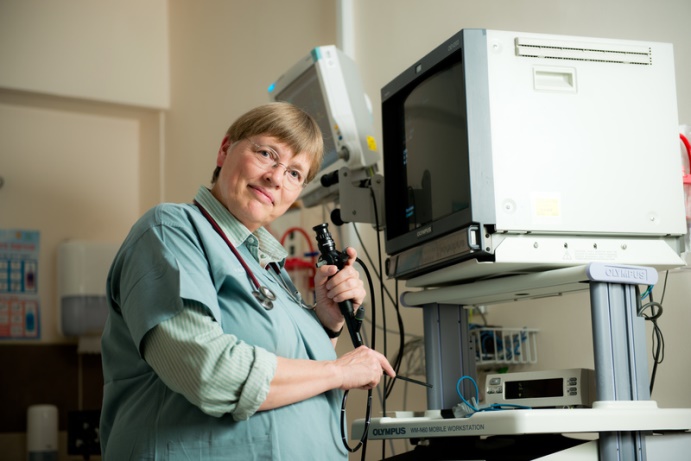“For many years a diagnosis of lung cancer was a death sentence, but now with new biological treatments, there is so much optimism for these patients."
One would be hard-pressed to find more distant places – in geography, culture and demographics – than Copenhagen and Beer-Sheva. Dr. Lone Avnon, a Danish born-and-raised pulmonologist at the Faculty of Health Sciences and Soroka University Medical Center, made this journey 30 years ago and has been a satisfied physician, mother and desert-dweller ever since.
Having completed high school in Copenhagen, Lone (pronounced Luna) decided to take a year off. Like many young Europeans, she was attracted by the promises of volunteer options on kibbutz and endless sun. She ended up on Mashabei Sadeh, a Negev kibbutz, where she met her future husband, kibbutz member Moty. The couple had five children while she was training in internal medicine.
“I have an Israeli family," says Lone. She prefers to be known by her first name only, having adopted the informal Israeli style long ago. “My kids speak Hebrew and English, and a little Danish. Hebrew is our main language at home." All five Avnon children have served in the IDF; three are still serving, two of them in combat units.

While Moty's grandfather was a rabbi in Jerusalem, Lone's family line contains ministers for 34 generations – back to the 14th century – but “religion is not an issue for us," she says.
Regarding life on the kibbutz, Lone has only good things to say. She speaks of the excellent child care, the laundry service, the quiet, the greenery. “I have never felt closed in here, and have always seen only the positives," she says. Her only disappointment involves the new age of privatization, which has marked the end of the traditional collective way of life.
“People are losing the commitment to communal life and contribution. At the same time, privatization has been beneficial in attracting young people, who are drawn by the option of being both kibbutz members and economically independent," she says, ending on an upbeat note.
It is in her role as doctor, though, where she feels her Negev location has been most advantageous. “Everyone is different here. You have Bedouin women, American-born immigrants and everything in between. This diverse population forces you to readjust all the time."
By treating different populations at Soroka University Medical Center, doctors gain exposure to patients with unusual problems and diseases. Beer-Sheva has a nearby border with Africa, and numerous refugees arrive seeking medical care, sometimes for tuberculosis, or for other respiratory tract disorders like pneumonia, asthma and emphysema, which are treated by pulmonologists.
The Bedouin population, in the midst of a transition from traditional nomadic lifestyle to settlement in western-style towns, presents old threats like TB, along with what Lone terms “the new luxury diseases" such as obesity, diabetes, sleep apnea and hypertension.
“When I was in medical school, we didn't see TB. It didn't exist. Between 1996 and 1997, a record number of immigrants arrived in the Beer-Sheva area. One hundred cases of TB were reported," she says.
“In the West, TB has virtually been eliminated, but in Israel, the influx of refugees and foreign workers from Africa and the East has led to a situation where active TB exists," she adds.

Pneumonia, another widespread illness, can hit anyone, according to Lone, who works to prevent it with flu shots. A firm believer in prevention, she staunchly favors vaccinations, which she calls, “one of the greatest advances in medicine." “You can't compare the side effects of vaccinations and the effects of the diseases themselves," she concludes.
Lung cancer patients also demand a good deal of Lone's attention, and she praises Soroka's treatment methods. Multi-disciplinary teams of surgeons, oncologists and pulmonologists work on each case, monitoring patients throughout their illness and providing superior treatment.
“For many years a diagnosis of lung cancer was a death sentence, but now with new biological treatments, there is so much optimism for these patients," she says, “Smoking should be forbidden like heroin."
While maybe to a lesser degree than cigarettes, sandstorms also affect respiratory health. In a cooperative research project, Lone is studying just how much damage the storms can cause. Through a NIS 1.2 million grant from the Israeli Environmental and Health Fund she works with Head of the Soroka Clinical Research Center, Dr. Victor Novack, and BGU's Department of Geography and Environmental Development, to address related questions.
On top of her clinical and academic tasks, Lone serves as academic coordinator of the Medical School for International Health, in collaboration with Columbia University Medical Center, which offers a unique four year degree program in cross-cultural medicine.
Characterized by their idealism, desire to give and support of volunteerism, these students, according to Lone, enjoy a truly cross-cultural experience. “They learn to be able to take care of anyone, anywhere, and learn to use low income resources to heal. They are prepared to practice medicine in their home countries or in places as diverse as India, Kenya and Ethiopia."
Reflecting on her own medical school training in Denmark, Lone recalls the rigidity of her over 600-year-old university. “They told us what to think," she says, “I love the dynamism here and the fact that everyone knows everyone. Here, students can challenge their professors. There's an open way of conducting education here, and BGU turns out good doctors."
